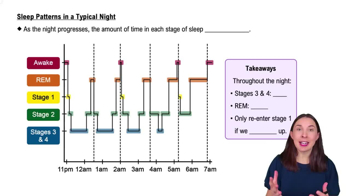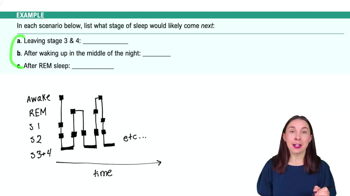Table of contents
- 1. Introduction to Psychology1h 43m
- 2. Psychology Research2h 20m
- 3. Biological Psychology2h 41m
- 4. Sensation and Perception28m
- 5. Consciousness and Sleep32m
- 6. Learning41m
- 7. Memory34m
- 8. Cognition37m
- 9. Emotion and Motivation35m
- 10. Developmental Psychology33m
- 11. Personality48m
- 12. Social Psychology41m
- 13. Stress and Health41m
- 14. Psychological Disorders44m
- 15. Treatment47m
5. Consciousness and Sleep
Sleep
Struggling with Psychology?
Join thousands of students who trust us to help them ace their exams!Watch the first videoMultiple Choice
Which of the following statements are true about the sleep cycle.
I. The sleep cycle refers to the 24-hour cycle of sleeping and waking.
II. On average, people go through 4-6 cycles per night.
III. The sleep cycle has two general phases.
A
I & II.
B
II & III.
C
I & III.
D
I, II, & III
 Verified step by step guidance
Verified step by step guidance1
Step 1: Understand the concept of the sleep cycle. The sleep cycle is not a 24-hour cycle; it refers to the stages of sleep that repeat several times during a night's sleep.
Step 2: Evaluate statement I. The sleep cycle does not refer to the 24-hour cycle of sleeping and waking. This is a description of the circadian rhythm, not the sleep cycle.
Step 3: Evaluate statement II. On average, people do go through 4-6 sleep cycles per night, each lasting about 90 minutes.
Step 4: Evaluate statement III. The sleep cycle has two general phases: Non-REM (NREM) and REM (Rapid Eye Movement) sleep.
Step 5: Determine which statements are true based on the evaluations. Statements II and III are true, while statement I is false.

 3:25m
3:25mWatch next
Master Circadian Rhythms with a bite sized video explanation from Hannah Gordils
Start learningRelated Videos
Related Practice


































































































![Race, Genes and IQ Differences | Bret Weinstein [Mini Clip]](https://img.youtube.com/vi/IztL_m3pd70/mqdefault.jpg)



































































































